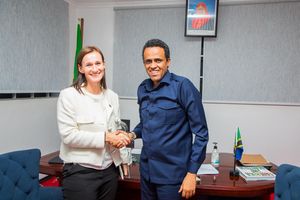Chadema changes tack in new political move

Chadema national chairman Freeman Mbowe
What you need to know:
- Mr Mbowe said a team of lawyers was putting together a number of constitutional cases to challenge NEC’s establishment, which he blamed for the “skewed” handling of the electoral process in the country.
Dar es Salaam. Chadema has embarked on a two-pronged approach in an attempt to survive a muddied political landscape that has left its political base exposed and deeply frustrated.
The party, which has faced a torrid experience following a string of losses in parliamentary and ward by-elections since November 2017, announced it was pulling out of future by-elections and was also headed to court to challenge what it says is the lack of independence of the National Electoral Commission (NEC).
Chadema national chairman Freeman Mbowe, who announced the move, said the party has lost interest in taking part in what he described as a “highly militarised and manipulated electoral process.”
Mr Mbowe said a team of lawyers was putting together a number of constitutional cases to challenge NEC’s establishment, which he blamed for the “skewed” handling of the electoral process in the country.
“We thought, as a country, we would learn something through our participation in the recent by-elections, but it is clear we cannot continue to bless these blatant acts of violating the electoral process,” he said.
He was addressing a press conference at the party’s headquarters in Kinondoni, a few days after losing at the ballot box the fourth parliamentary seat to CCM.
The lost seats are Ukonga, Siha, Buyungu and Monduli. Other than the death of the Buyungu MP, the other seats were re-contested following the defection of three of its former MPs to CCM.
Chadema has also lost several dozens of ward by-elections as the office holders continue to troop into CCM in defections.
The decision to boycott by-elections received mixed views, with CCM spokesperson Humprey Polepole saying it was a sign of “surrender”.
NEC chairman Semistocles Kaijage said every political party has the right to either participate in elections or not. “The commission cannot force them to participate in elections.”
Parties should file their complaints in court and confirm their allegations for justice to take its course instead of rushing to the media,” the chairman said when asked to give his views.
Prof Gaudence Mpangala of Ruaha University said the decision to boycott elections is not surprising because stakeholders have been demanding the same for years in order to level the playing field.
“They should continue fighting for their rights because economic development shouldn’t silence the opposition from fighting for democracy,” he said.
But Mr Richard Mbunda of the University of Dar es Salaam said the boycott may have a negative effect on the party as other smaller parties will still participate at its expense.
“This is like the case of CUF in Zanzibar and I’m not sure if Chadema thought through this decision well.”
At yesterday’s briefing, Mr Mbowe sought to assure supporters that the move was taken with the interests of the country and that of the party at heart.
“The ballot box has ceased to be the means of getting legitimate representatives,” he said, adding that there have been deliberate foul play that made by-elections a sham.
He said Chadema will not take part in the Liwale constituency by-election as well as 37 civic by-elections scheduled for October 12.
His communication came after a meeting of the central committee and will be a win for a section of the party’s membership that has been pushing for a boycott and blaming Mr Mbowe for not acting fast to forestall a meltdown as its strongholds continue to be undermined by defections and subsequent loss to CCM.
Chadema’s move to court is similar to that of activist-lawyer Bob Wangwe in March this year.
Mr Wangwe’s petition at the High Court in Dar es Salaam, supported by the Tanganyika Law Society (TLS) and the Legal and Human Rights Centre (LHRC), seeks to end the election role of district executive directors (DEDs), who are presidential appointees.




